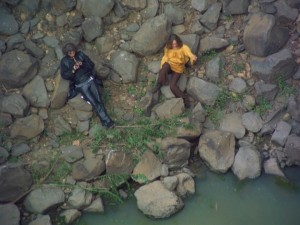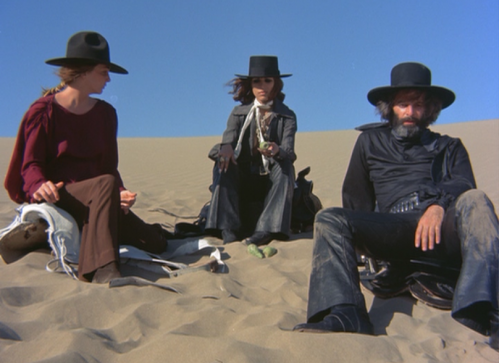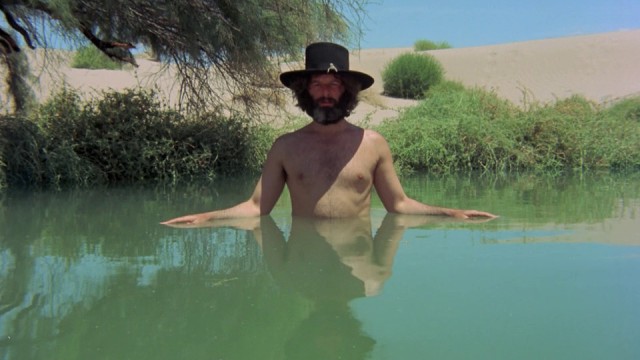A recent documentary, Jodorowsky’s Dune (2013), unfolded the fascinating story of the efforts of Alejandro Jodorowsky to direct a film version of Frank Herbert’s sci-fi classic about messianic prophesies and political revolution on a desert planet. Dune was eventually made in 1984 by David Lynch, whose well-honed sense of warped Americana didn’t sit very well with viewers expecting a more cosmic tune. The mind reels, thinking about what Jodorowsky could have brought to the project. For compelling evidence there’s the ambitious film he earlier directed, wrote, and starred in: El Topo (1970).
 Like Dune, El Topo takes place in the desert, an ideal place for a vision-quest. Jodorowsky plays the title character (The Mole), dressed in black like a shaggier version of The Man with No Name in Sergio Leone’s spaghetti westerns. The opening scene of slaughter with carnage reddening the water and bodies hanging from the rafters in a nameless town outdoes even Leone’s apocalyptic fantasies. But what sets the wheels turning in El Topo is not the dream of a material payoff, but something far harder to explain: Jodorowsky piles on the mythic symbols (Medieval Christian, Zen Buddhist, 60s New Age, to name just three) to create something so grandiose that it pretty much stretches the limits of cinematic representation. Call it a film about the endless cycles of metaphysical transformation, if you will.
Like Dune, El Topo takes place in the desert, an ideal place for a vision-quest. Jodorowsky plays the title character (The Mole), dressed in black like a shaggier version of The Man with No Name in Sergio Leone’s spaghetti westerns. The opening scene of slaughter with carnage reddening the water and bodies hanging from the rafters in a nameless town outdoes even Leone’s apocalyptic fantasies. But what sets the wheels turning in El Topo is not the dream of a material payoff, but something far harder to explain: Jodorowsky piles on the mythic symbols (Medieval Christian, Zen Buddhist, 60s New Age, to name just three) to create something so grandiose that it pretty much stretches the limits of cinematic representation. Call it a film about the endless cycles of metaphysical transformation, if you will.
At times, we seem lost in the protagonist’s mind, where logic and proportion fade away in the desert heat. The sporadic and cryptic dialogue is steeped in paradox. El Topo is told by a mysterious woman, the mother of a master gunfighter he is about to engage with in a duel: “The deeper you fall, the higher you’ll get,” echoing the psychedelic overload of The Beatles’ “Everybody’s Got Something to Hide Except Me and My Monkey” (“The deeper you go the higher you fly/The higher you fly the deeper you go”). John Lennon turned out to be a huge fan of the film, helping Jodorowsky to fund his next gonzo release, The Holy Mountain (1973).
 As we are now in an imagined landscape perfectly fit for a superhero, the film’s emphasis is mainly on the visuals, which results in some breathtaking compositions, such as when the camera pulls far back from an Edenic canyon, where brown, grey, and green earth tones shift to the shimmering blue of the sky. In yet another religious allusion, water gushes from a rock, spilling onto the waves of sand that create a seemingly boundless terrain. Jodorowsky’s skills as a director keep the repetition of the first half of the film—the superhero dueling, one at a time, with four master gunfighters—from sinking into mere routine: each duel is presented somewhat differently, each another piece of the puzzle that is the protagonist’s psyche.
As we are now in an imagined landscape perfectly fit for a superhero, the film’s emphasis is mainly on the visuals, which results in some breathtaking compositions, such as when the camera pulls far back from an Edenic canyon, where brown, grey, and green earth tones shift to the shimmering blue of the sky. In yet another religious allusion, water gushes from a rock, spilling onto the waves of sand that create a seemingly boundless terrain. Jodorowsky’s skills as a director keep the repetition of the first half of the film—the superhero dueling, one at a time, with four master gunfighters—from sinking into mere routine: each duel is presented somewhat differently, each another piece of the puzzle that is the protagonist’s psyche.
Put these pieces together, and a pointed social message develops. After killing the gang responsible for the destruction of the town, El Topo runs off with a woman who was the gang leader’s captive. El Topo is infatuated with her. She tells him he must win her love by defeating the four masters, even cheating if necessary. He cheats and wins, but soon will face karmic retribution.
In particular, the second master’s philosophy opposes the superhero’s code of masculine violence—and also foretells the woman’s betrayal:
“Perfection is to get lost. In order to get lost, you have to love. You don’t love. You destroy, you kill, and no one loves you. For when you think you are giving, you are really taking away.”
 Thus the film combines its criticism of winning at all costs with a more metaphysical depiction of the death of the ego. This all happens when El Topo is shot down by the woman, who runs off with her female lover (a misogynist touch that hangs, like the dust of the hippie mythos, in the air). He is rescued by a misfit tribe and ends up in their underground cave, having now literally become “the mole.”
Thus the film combines its criticism of winning at all costs with a more metaphysical depiction of the death of the ego. This all happens when El Topo is shot down by the woman, who runs off with her female lover (a misogynist touch that hangs, like the dust of the hippie mythos, in the air). He is rescued by a misfit tribe and ends up in their underground cave, having now literally become “the mole.”
If the first half of the film quoted Leone, the second borrows from Federico Fellini’s funhouse imagination. Once more the film drifts off, this time into a hazy story about the efforts of the superhero, now humbly dressed in the garments of a monk, to gain redemption by blasting a hole through the rock walls to free him and his people. But the story’s real purpose is to frame a series of set pieces that feature slapstick humor, a grotesque portrayal of slavery and bigotry, and religious satire (focused on the dependence of church leaders on the appearance of miracles) that anticipates by nearly a decade Monty Python’s Life of Brian (1979).
El Topo, however, ends with another bloody gunfight, as if Jodorowsky cannot escape the violence he earlier condemns. Perhaps, he suggests, a cycle of destruction is part of the process of transformation. We are left with the question of what the superhero has accomplished unresolved. It is even possible that his quest is a fool’s errand, after all.
Upping the philosophical ante on comic-book superhero movies, El Topo demonstrates how films built out of mythic fantasies are ideally equipped to question, expand, and transform the stories we tell about ourselves and about our world. The superhero has always pushed against restrictions on storytelling, suggesting there is more to reality than what our senses can perceive, encouraging us to put our imagination to good use.
This is why any claim that Hollywood has run out of ideas could almost seem ridiculous on its face. Sure, the execs are to blame for their rush for the newest thing, strip-mining ideas for their immediate profitability rather than promoting their careful treatment: Jodorowsky certainly did not assemble his mythic universe overnight. And what his film proves is that the power of myths is not solely based on language, but on feeling and metaphysical form. Indeed, the dialogue in El Topo tends not to report on the action, but rather serves as counterpoint, sometimes ironic, sometimes aphoristic.
Following Jodorowsky’s lead would help Hollywood to make films that would be more appealing to global viewers. Instead of serving as an excuse to simplify and reduce thematic content, the desire to compete in global markets should compel the major studios to be more receptive to diverse and complex cultural themes, rather than giving the sad impression that the best Hollywood filmmakers can do is function as tourists. One could even argue that a one-dimensional view of culture supports the grinding down of the personal visions of these filmmakers, resulting in faceless product that, by intending to appeal to everyone, really appeals to no one.
 Hopefully comic-book superhero films might, in the future, follow the precedent set by El Topo: making ideas entertaining, rather than straining to make entertainment in some way ideologically meaningful. Looking back, it seems no accident that El Topo was set in a grim vision of the mythic West; Jodorowsky thinks that superheroes must be tested in rugged environments. As his artistic philosophy is expressed in the film, it is particularly critical of what some people will to do get ahead; compromise is a sign of failure, regardless of the appearance of success. It is a lesson which Hollywood could be reminded of more frequently.
Hopefully comic-book superhero films might, in the future, follow the precedent set by El Topo: making ideas entertaining, rather than straining to make entertainment in some way ideologically meaningful. Looking back, it seems no accident that El Topo was set in a grim vision of the mythic West; Jodorowsky thinks that superheroes must be tested in rugged environments. As his artistic philosophy is expressed in the film, it is particularly critical of what some people will to do get ahead; compromise is a sign of failure, regardless of the appearance of success. It is a lesson which Hollywood could be reminded of more frequently.

